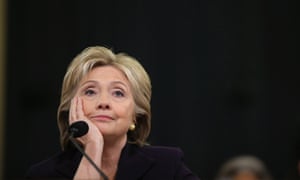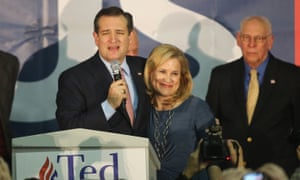Moments that have defined the US presidential election campaign
 |
| Dump Trump: protests against the presumptive Republican nominee have intensified in recent months. Photograph: San Diego Union/Rex/Shutterstock |
From the birth of the Bernie movement to the Trump speech that changed everything, it’s been a wild ride on the campaign trail so far
June 2015: For Republicans, it all began on an escalator. Donald Trump descended one at Trump Tower on 16 June 2015. He announced he was running for president and set the tone for a campaign like no other. “They’re bringing drugs,” he said of Mexicans. “They’re bringing crime. They’re rapists. And some, I assume, are good people.” Jon Stewart was still presenting the Daily Show and thanked the heavens for this godsend to satire. Trump, it seemed, was a no-hope joke.
The Bernie movement is born

July 2015: Septuagenarian socialist Bernie Sanders, who had announced his presidential run in April 2015 from a modest lectern in a low-key press conference, was initially dismissed as quixotic. But the size of crowds at his rallies said otherwise. Last July nearly 10,000 people turned out for the senator in Madison, Wisconsin, dwarfing the crowds that Democratic heir apparent Hillary Clinton was able to draw. “Tonight we have made history,” Sanders declared to loud applause. An unlikely movement had been born.
August 2015: The first Republican primary debate. Host Megyn Kelly of Fox News challenged Trump: “You’ve called women you don’t like fat pigs, dogs, slobs, and disgusting animals.” He retorted: “Only Rosie O’Donnell.” Later, in a CNN interview, Trump reflected: “You could see there was blood coming out of her eyes, blood coming out of her wherever.” The tone had been permanently lowered and, at a later debate, Trump would even reference his private parts. One of the most unpopular candidates among women in history, he now looks set to face America’s first female presidential nominee. October 2015: Future historians will debate whether Sanders would have had a better chance if he had gone for Clinton harder and sooner. Perhaps the decisive moment came in the first Democratic debate when the issue of her use of a private email server as secretary of state cropped up. Sanders said bluntly: “I think the secretary of state is right, the American people are sick and tired about hearing about your damn emails.” They have heard more about it since as an FBI investigation continues, but Sanders’ decision to avoid attacking on this front has been described as the biggest mistake of his campaign.
Clinton triumphs in 11-hour Benghazi grilling
October 2015: They came to bury Clinton. They failed. In October she put the controversy over terrorist attacks in Benghazi firmly behind her after 11 hours of meandering questions from conservative critics on Capitol Hill failed to derail her presidential run. Clinton showed her mettle, defended her decision to push for the Libyan intervention and set out her accomplishments as secretary of state, a job that one friend says left her “armor plated”. What could have been a millstone around the neck of her election campaign was converted into a badge of strength.
Trump loses Iowa and behaves … graciously
February 2016: Trump erupted into US politics with braggadocio, an elephant-sized ego and a fusillade of insults. So how would he react when he lost the first caucus, in Iowa to Ted Cruz? News networks salivated at the prospect of him throwing a sore loser tantrum. Yet, the Washington Post recorded, “what followed was one of the most atypical, un-Trump speeches of his entire eight-month-old campaign”. The losing candidate graciously thanked the people of Iowa and described himself as “honored”. In that moment it became clear he could not be written off as a petulant clown.
February 2016: It was supposed to be Bush v Clinton in November. Jeb Bush, son and brother of former presidents, had the name, the money and the establishment backing, but not the chops. At one of countless rallies in New Hampshire he described all the ways in which he would protect the homeland. Silence. “Please clap,” he entreated. The audience laughed, then finally burst into applause, but it was clear New Hampshire would be Bush’s graveyard.
February 2016: Marco Rubio once seemed poised to become the Republican establishment’s choice. But when, in a debate in New Hampshire, Chris Christie taunted him over being able only to recycle a “memorized 25-second speech”, the Florida senator inadvertently made his point for him by repeating a soundbiteabout Barack Obama having a deliberate plan to transform America. When Christie pounced, Rubio repeated it yet again. The “Marcobot” had been exposed and, he now admits, suffered negative coverage from which he never recovered.
March 2016: Trump stood accused in March of inciting racially charged violenceamong his followers and TV footage showed protesters being pushed, shoved and punched. Then came Chicago. There were skirmishes inside the arena and there was a tense standoff outside it. At the last minute, the rally was cancelled, prompting a joyful cheer from protesters and anger from Trump supporters. There have since been similarly ominous scenes in California, New Mexico and elsewhere, prompting some observers to compare the brash billionaire with charismatic fascists of the past.
May 2016: Weeks later, Trump was on course for victory. In desperation, Ted Cruz, campaigning in Evansville, Indiana, told reporters: “I’m going to do something I haven’t done for the entire campaign, for those of ya’ll who have traveled with me all across the country. I’m going to tell you what I really think of Donald Trump.” The Texas senator threw everything but the kitchen sink at his opponent, branding Trump a “pathological liar”, “utterly amoral”, “a narcissist at a level I don’t think this country’s ever seen” and “a serial philanderer”. It was the thrashing tail of a dying animal. Cruz lost Indiana and dropped out of the race. Trump’s once unthinkable ascent was complete.


0 comments: